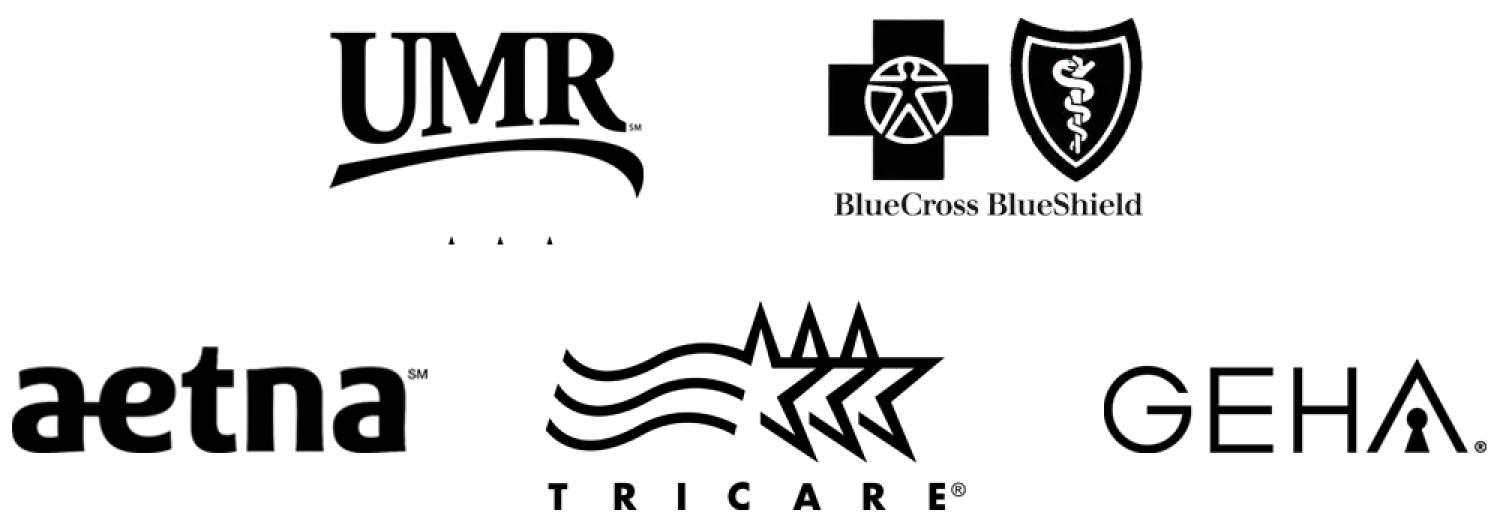Cornerstone
Understanding GEHA Drug Treatment Coverage
Learn about using your GEHA insurance policy to cover alcohol and drug treatment
Alcohol and Drug Treatment Coverage with GEHA
When struggling with drug or alcohol addiction, getting the right treatment is crucial. If you or a loved one is a current or former federal employee, military retiree, or family member, GEHA (Government Employees Health Association, Inc.) insurance may provide the necessary coverage. Understanding your insurance coverage is essential as you navigate recovery. Here we explore the ins and outs of their network coverage, claims approval process, types of plans available, deductibles, and options for those facing financial hardships. By the end, you’ll have a clearer picture of how your insurance company can support you on your journey to healing and sobriety.
Jump to the following sections
View our addiction treatment locations
Addictions we treat at Cornerstone
geha drug treatment coverage
In-Network
Out-of-Network
When considering drug treatment, opting for an in-network facility with your GEHA insurance can offer significant advantages. In-network providers contract with GEHA to offer services at a set price, which typically means lower out-of-pocket expenses for you. This can make treatment more accessible and affordable. However, it’s important to note that your choice of treatment centers may be more limited when staying in-network. If you have a specific facility in mind, checking whether they are in-network with is crucial to avoid unexpected costs.
You may still have options if your preferred drug treatment center is out-of-network with GEHA. Choosing an out-of-network facility can give you more flexibility regarding location and treatment approach. However, it’s essential to be aware of the potential drawbacks. Out-of-network facilities may not have a contract with GEHA, which means you could be responsible for a larger portion of the treatment costs or, in some cases, the full rehab cost. Before deciding, it’s wise to contact the facility and ask about payment plan arrangements, financial aid, discounts, or sliding scale fees to help manage the expense.
Information about GEHA Plan Types
Elevate
The budget health insurance plan is designed for individuals seeking essential coverage while emphasizing the benefits of maintaining a healthy lifestyle. As the plan with the lowest premiums and minimal copays, it offers an economical choice without compromising on quality. Subscribers can access exclusive features that promote wellness, including chiropractic care, acupuncture, and comprehensive mental health services. Additionally, members have the opportunity to earn up to $500 in wellness rewards annually, further enhancing the plan’s value. An added bonus includes an annual perk valued at $125, specifically tailored to enrich subscribers’ health and well-being.
GEHA Standard
High Option
The dependable health insurance plan is designed for individuals seeking extensive coverage. With a premium of $306.26 biweekly, it offers low copays for doctor visits and comprehensive prescription coverage. Key benefits include a $1,000 reimbursement for Medicare Part B premiums and waived coinsurance and copays for Medicare Parts A & B enrollees, making it an ideal choice for those with significant healthcare needs who require robust financial protections.
High Deductible Health Plan (HDHP)
HDHP plans are designed to have lower monthly premiums but higher deductibles. The HDHP is an economical health insurance option designed for those who prioritize savings and anticipate future medical needs. This plan features a lower-than-expected deductible and modest premiums, making it an attractive choice for budget-conscious individuals. A new feature for 2024 includes a GEHA contribution of $1,000 for individuals or $2,000 for families, effectively reducing out-of-pocket expenses. Additionally, the plan is triple tax advantaged through a Health Savings Account (HSA), enhancing the financial benefits for members. The HDHP also offers unlimited telehealth visits, covering general and mental health, ensuring convenient access to healthcare professionals through MDLIVE. After meeting their deductible, members are reimbursed fully for MDLIVE services, underscoring the plan’s commitment to comprehensive and accessible health coverage.
Elevate Plus
Understanding Policy Terminology
Deductible
Co-Insurance
Out-of-Pocket Max
The deductible is critical to understand regarding your GEHA insurance policy, especially when seeking drug treatment. The deductible is the amount you must pay out of pocket for covered services before your insurance begins to pay.
For example, if your plan has a $1,000 deductible, you must pay the first $1,000 of your drug treatment costs before GEHA covers some expenses. It’s essential to factor in your deductible when budgeting for addiction treatment, as it can significantly impact your upfront costs.
Co-insurance is another important term to familiarize yourself with when navigating your GEHA policy for drug treatment. Co-insurance refers to the percentage of covered healthcare costs you’ll pay after meeting your deductible.
For instance, if your plan has an 80/20 co-insurance, GEHA will cover 80% of your drug treatment costs after you’ve met your deductible, while you’ll be responsible for the remaining 20%. Understanding your co-insurance can help you better estimate your out-of-pocket expenses for addiction treatment.
The out-of-pocket max is a crucial safeguard in your policy that can provide peace of mind when seeking drug treatment. This term refers to the maximum amount you’ll have to pay for covered services in a given plan year.
Once you’ve reached your out-of-pocket max, your insurance will cover 100% of your eligible drug treatment costs for the remainder of the plan year. Knowing your out-of-pocket max can help you plan for the most you’ll need to spend on addiction treatment, giving you a clearer financial picture as you focus on your recovery journey.
GEHA Approval Process for Treatment
Verification
Submission
Adjudication
Payment
Appeal
Before beginning drug treatment, the first step is to verify your GEHA insurance coverage. The treatment center you choose will contact GEHA to confirm your active policy and determine the specifics of your coverage. During this process, the treatment center will also identify any out-of-pocket costs you may be responsible for, such as deductibles or co-insurance.
This verification step is crucial, ensuring you have the necessary coverage and helps you understand any financial obligations upfront. Consider using our verify insurance tool to streamline the verification process.
Once your coverage is verified and you begin drug treatment, the treatment center will typically handle the claims submission process on your behalf. The facility’s billing department will gather all necessary documentation, including itemized bills and medical records, and submit the claim to GEHA for processing.
Having the treatment center manage the claim submission allows you to focus on your recovery without the added stress of navigating insurance paperwork.
After GEHA receives the claim from your treatment center, they will review the information to determine if the services provided are covered under your policy. This process is called adjudication.
GEHA will assess medical necessity, provider network status, and your specific plan benefits. Based on this assessment, they will decide whether to approve or deny the claim and, if approved, the amount they will pay the treatment center.
If your claim is approved during adjudication, GEHA will issue payment to the treatment center according to your plan’s coverage. The treatment center will then bill you for any remaining out-of-pocket costs, such as deductibles or co-insurance.
It’s important to note that the amount you owe may vary depending on your specific plan and the services provided.
If your claim is denied, don’t panic. Treatment centers are experienced in handling denials and will likely file an appeal on your behalf. Their billing department will work diligently to gather additional information and make a strong case for why the services should be covered.
It’s important to remember that treatment centers strive to provide only services that are likely to be approved, minimizing the risk of denial. However, if a denial does occur, you can trust that the treatment center will do everything in its power to overturn the decision and ensure you receive the care you need.
Get Help Paying Your Deductible
File a Hardship With GEHA
If you’re struggling to pay your deductible for drug treatment, filing a hardship with GEHA may provide some relief. Most insurance companies offer hardship provisions for members who are experiencing financial difficulties. To apply, you’ll need to contact them through a drug and alcohol treatment center or directly and provide documentation of your financial situation. They may waive or reduce your deductible if approved, making accessing the care you need more affordable. Remember that hardship applications are reviewed case-by-case, and approval is not guaranteed.
Assistance Programs & Payment Plans
Many drug treatment centers understand that paying deductibles can be a significant financial burden. To help alleviate this stress, some facilities offer assistance programs or payment plans. These programs may allow you to spread out your deductible payments over time, making getting the treatment you need more manageable. Some centers may also have scholarships or grants to help cover a portion of your deductible. When researching treatment centers, don’t hesitate to ask about these options and see if you qualify for financial assistance.
Community & Charitable Resources
In some cases, community resources and charitable organizations can help you cover your deductible for drug treatment. These organizations recognize the importance of accessing quality care and want to support individuals on their path to recovery. Some local churches, non-profit groups, or addiction support organizations may have funds set aside to assist with treatment costs. It’s worth reaching out to these groups in your community to see if they can offer any financial help or point you toward other resources. Remember, there is no shame in seeking assistance – these organizations are here to support you in getting the care you need to overcome addiction.
FAQs About Using GEHA Benefits to Pay for Alcohol and Drug Treatment
Does GEHA cover drug and alcohol rehab?
How much does GEHA cover for rehab?
The amount of rehab coverage varies depending on your specific GEHA plan. Factors such as your deductible, co-insurance, and out-of-pocket maximum will impact how much you’ll need to pay out of pocket. It’s best to contact GEHA directly or work with your chosen treatment center to verify your coverage and understand your financial responsibilities.
What types of addiction treatment does GEHA cover?
How do I get my insurance company to pay for rehab?
What if my claims are denied?
If GEHA denies your claim for rehab, don’t lose hope. The treatment center’s billing department will likely file an appeal on your behalf. They will work to gather additional information and make a strong case for why the services should be covered. Treatment centers are experienced in navigating the appeals process and will do their best to ensure you receive the care you need.
Sources
CLINICALLY REVIEWED

Lionel Estrada, LISAC
CLINICAL DIRECTOR
Lionel, our Clinical Director is a Licensed Independent Substance Abuse Counselor (LISAC) with over 4 years at Cornerstone, specializes in addiction and mental health. Trained in EMDR therapy, he employs a trauma-informed, empathetic approach to address the underlying causes of these issues.
- Read our Editorial Policy
Still have questions about treatment?
Our admissions specialists are here to explain the process, answer any questions you may have, and ensure you’re getting the help you need to live a healthy life free from addiction.























